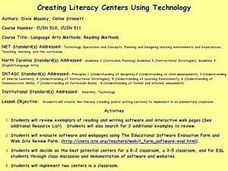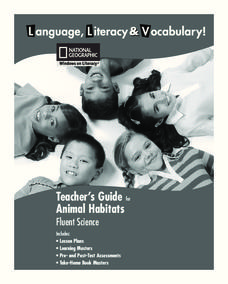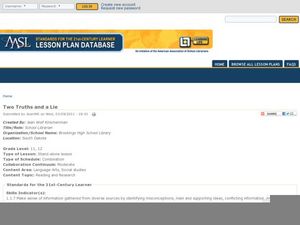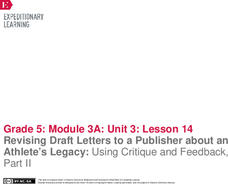Curated OER
Courage of the Heart
Students research discrimination and how people fought against for the common good. In this discrimination lesson, students watch a movie about Alfred Blalock and Vivien Thomas. Students generate a list of words about discrimination....
Curated OER
Media Literacy: Discovering and Understanding Propaganda
Ninth graders study different types of propaganda and select an issue that is significant to them. In this exploratory lesson students design and create posters on the topic of their choice and write a narrative describing it.
Curated OER
Lincoln Meets Gates
Students research historical figures and create presentations for their research using technology tools. In this historical figures lesson, students use the provided links to research historical figures in America. Students then use...
Curated OER
Icon Adoration: The Byzantine Empire
Students study idol worship in the Byzantine Empire and the separation it cause between the Roman Catholic and Orthodox churches. In this Byzantine Empire lesson, students study pictograph transparencies and take a pop quiz over them....
Michigan Sea Grant
Water Quality
Learners observe water samples and measure the samples' water quality. Students develop their own criteria for measuring water quality and test for temperature, acidity, oxygen levels, turbidity, conductance, sediment and hardness.
Curated OER
Historic Heroes
High schoolers recognize traits of heroes as depicted in music, art and literature. In this cross curricular lesson, students evaluate and analyze various works fo art from different cultures that depict heroes.
Curated OER
Creating Literacy Centers Using Technology
Students create two literacy (reading and/or writing) centers to implement in an elementary classroom. Students review examples of educational software and determine the best potential centers to use in elementary classroom. Two centers...
National Geographic
Animal Habitats
Explore animal habitats and reinforce speaking, listening, reading comprehension, and writing skills with a unit that focuses on the Arctic, desert, ocean, prairie, and rainforest. Enthusiastic scientists read informational text to...
Smithsonian Institution
Dia de los Muertos: Honoring our Ancestors Through Community Celebration
Oral storytelling has been an important part of every culture. The time-honored practice uses stories as a conduit for a culture's values and customs from one generation to the next. Keep the tradition going with a family interview...
Teaching Tolerance
Buddy Share
Here's a project that gives academics the chance to share their opinions on social justice with storytelling, creative writing, or art. Scholars choose what they want to create and are assigned buddies to support their efforts. To...
EngageNY
Building Background Knowledge: Competing Views Regarding Mining on Inuit Lands
Scholars build background knowledge about mining on Inuit lands. Working in small groups, they sort information about the Inuit onto a point of view chart to determine if mining is beneficial to Inuit communities.
The New York Times
I Don’t Think So: Writing Effective Counterarguments
When it comes to writing effective arguments, writers must do more than simply make a claim, counterarguments must be considered. Aspiring writers analyze counterarguments in editorials, and then learn how to write counterarguments in...
Syracuse University
Ancient World Writing System
Most twenty-first century pupils don't know how to interpret cuneiform. Examining images of cuneiform and papyrus writing and using a chart and Venn diagram, young historians extrapolate what life may have been like for people who lived...
Constitutional Rights Foundation
Ellis Island—The “Golden Door” to America
Are you one of the 100 million Americans whose ancestors passed through the doors of Ellis Island? Learn about the historic entry point for immigrants in the late 19th and early 20th centuries with an informative reading passage. After...
Curated OER
Two Truths and a Lie: Internet Research Skills
It's tough for high schoolers to assess what is a credible resource and what is not. A helpful resource prompts class members to research a particular topic and record two facts—and create one lie—while documenting the sources. They...
EngageNY
Group Discussions and Revision: Editorial Essay
Great minds think aloud! Pupils participate in the Fishbowl protocol, discussing their opinions about the Mary River mine proposal. As they share their thoughts, peers provide feedback about their thesis and supporting ideas.
Science Matters
Lotusland
It's time for a field trip! Scholars take their new-found knowledge of adaptations and seed dispersal on a field trip to a local botanical garden. They gain an up-close look at how ecological interdependence works in a distinct...
EngageNY
Setting Purpose for Research: What are Fair Working Conditions?
Life may not be fair but working conditions should be. Scholars research working conditions at Wegmans by studying the company website. They complete a working conditions anchor chart and discuss their findings in a think-pair-share...
EngageNY
Performance Task: Planning the Final Brochure
Partners use a Brochure Planning Guide to create brochures giving advice to consumers about products based on the research they finished about working conditions. After planning the brochure, they complete a sketch outline and then...
EngageNY
Revising Draft Letters to a Publisher about an Athlete’s Legacy: Using Critique and Feedback, Part II
Let's get opinionated. Scholars participate in a peer critique and revision process using a fun activity called a Four Corners strategy. After incorporating classmates' feedback, individuals share their final drafts of their opinion...
EngageNY
Revising Draft Letters to a Publisher about an Athlete’s Legacy: Critique and Feedback, Part I
Pick a corner, any corner! Pupils use the Four Corners strategy and Peer Critique protocol to assess one another's draft letters to a publisher about an athlete's legacy. Scholars then use peer feedback to revise their letters.
EngageNY
Analyzing Point of View: Inferring about the Natural Disaster in Eight Days
Who is telling the story? Readers take a look at the text Eight Days to determine if the story is told in first or third person. They then discuss in groups and complete a shared writing activity to describe how the narrator's point of...
EngageNY
Speech Writing: Identifying Criteria for a High Quality Conclusion
Learning is never-ending. Scholars learn about effective conclusions as they continue watching a video of an opinion speech. After analyzing the speech's conclusion, they work in small groups to write an ending for their own speeches.
Alabama Learning Exchange
Exponents and Division
Create a human fraction to learn about division of exponents. Scholars develop the rule for division of exponents by being part of a human fraction to explore and justify the rule. They also consider zero exponents and negative exponents.























